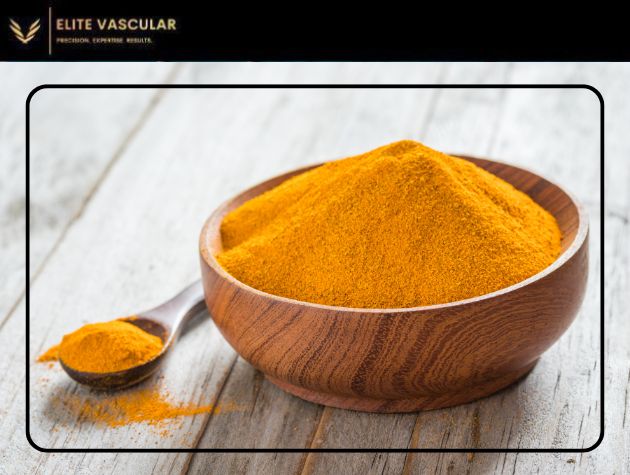Varicose veins can be described as disfigured bulging veins that can most often be seen on legs. They cause pain, discomfort and self- esteem issues. People often have the option of venous medical treatment interventions like laser operation or vein ablation. Besides medical treatment, there are a number of natural remedies to assist with the symptoms and turmeric is one such option that has been promoted.
Understanding Varicose Veins and Their Causes
The cause of the most varicose veins is caused by weak walls and valves within the veins causing irregular blood flow within the veins. Many factors can contribute to the condition, including prolonged standing and sitting, obesity, pregnancy, and genetic predisposition. These veins are sometimes accompanied by pain and heavy aching legs, or noticeably enlarged veins which can be purple or blue in color along with swelling at times also.
As with other natural cures, the role in managing varicose veins focuses on the increasing blood circulation, minimizing edema and pain symptoms. Because of its spice, turmeric has gained popularity as a natural treatment due to its potent anti-inflammatory and antioxidant properties.
Why Turmeric Is Considered for Varicose Veins
Turmeric has several effective compounds within it and significantly has curcumin. A number of scientific studies have been done on the health benefits of curcumin. According to previous research, it may assist in solving the problem more effectively by decreasing inflammation, increasing blood circulation, and reinforcing blood vessels.
Anti-Inflammatory Effects
Inflammation in the veins may aggravate varicose veins, making affected patients experience pain and swelling on some occasions. However, turmeric contains substances that reduce this swelling, providing a great deal of comfort.
Improved Circulation
Blood flow is of the utmost importance when it comes to blocking the development of previously existing varicose veins. Curcumin does so by lowering blood viscosity, thus preventing potential clots that could obstruct veins and aggravate the condition.
Antioxidant Support
Oxidative stress leads to the death of the vascular structures which contributes to the weakness of veins. However, turmeric contains antioxidants that can help with this and protect the veins from harm increasing the function of the entire vascular system.
How to Use Turmeric for Varicose Veins
Turmeric can be used in the treatment of varicose veins by making dietary commitments, supplementing, or topical application.
Dietary Use
Turmeric can easily be added to food as it makes a great difference for people. Use it in your curries, soup or even golden milk. It is best to combine turmeric and black pepper together as this enhances the empolysment of curcumin.
Supplements
Concentrated curcumin supplements come as capsules or tablets and are commonly used turmeric products. Consult with a healthcare professional on how much would be best depending on how much is needed.
Topical Application
Turmeric paste is also an option for direct topical applications on the affected regions. You may combine turmeric powder with a carrier oil like coconut oil and massage it into the skin surfaces. This technique could lessen inflammation and relieve some pain locally.
Benefits of Turmeric for Varicose Veins
Integrating turmeric for the management of varicose veins along with the complete strategy proves advantageous in these ways:
- Swellings and Pain: In any event, persistent exposure could cut down on leg soreness and inflammation.
- Enhancing the Appearance: It is possible that in time, the visible varicose veins could become less prominent through the advancement of vascular support.
- Promotes Healing: Turmeric appears to be effective in helping repair damaged blood vessels and thus enhancing the general strength of veins.
Complementary Natural Remedies
Turmeric alone is quite effective; nevertheless, it is even more effective when used in conjunction with other natural alternatives.
- Compression Stockings: This helps to alleviate stress in the veins and improves blood circulation to the region.
- Leg Elevation: Above cardiac level, blood is less likely to accumulate in the lower extremities.
- Exercise: Activities including walking or swimming improve blood flow and tighten leg muscles.
- Herbal Remedies: In addition, horse chestnut and witch hazel are well-known remedies for bolstering veins and can help enhance turmeric’s effect.
Precautions and limitations
Turmeric has an extensive use in Ayurvedic medicinal preparations, and is relatively safe, but has its share of risks – stomach upset, for one, especially if consumed in large doses. It may also affect the action of other medicines, such as anticoagulants. If you are on blood thinners or have gallbladder problems, seeking medical advice before using turmeric is necessary.
It’s also important to understand that while turmeric can help manage the symptoms, it can’t treat varicose veins or varicose veins in advanced stages. The best results may occur when natural methods are used in conjunction with medical treatment.
When to contact the doctor
If the patient complains of pain due to varicose veins, or swelling of the veins which is accompanied by skin changes like ulcers, they may need medical assistance. On such occasions, it is important to be alert as these could be deeper lying problems such as deep vein thrombosis or chronic venous insufficiency. You should seek care from a vein specialist who can evaluate his problem and treat him.
Maintaining balance in life
Due to the anti-inflammatory and the oxidants in turmeric, the application of this spice can be integrated into the herbal treatment for varicose veins naturally. But combine the use of turmeric with a balanced diet, regular exercises, and proper nutrition with medical interventions where necessary.
With consistent care of the affected area, for example with turmeric, the symptoms can be alleviated, vein health can be improved and comfort in everyday life can follow.
